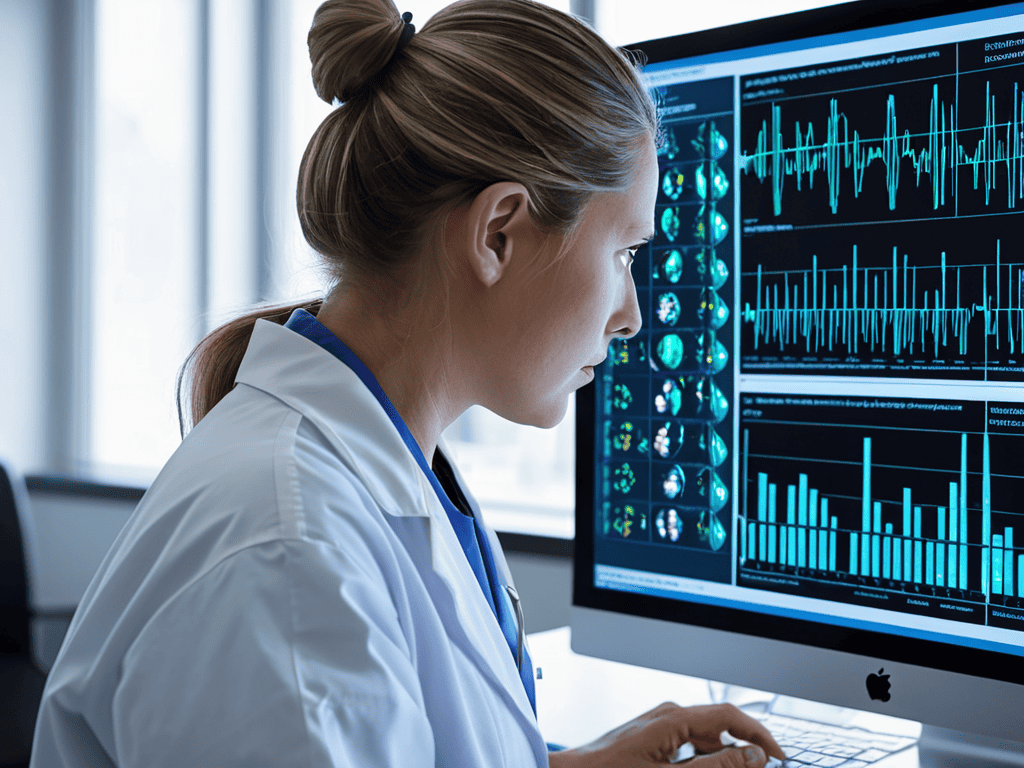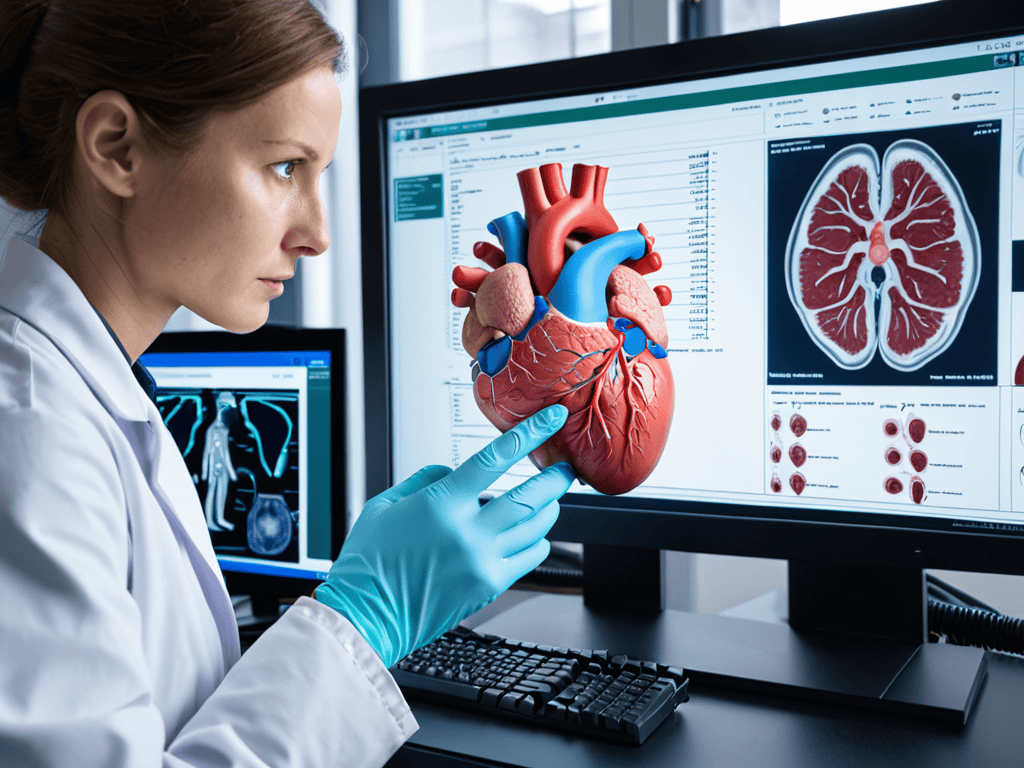As I reflect on my years designing aircraft, I’m often frustrated by the overcomplicated narrative surrounding how AI is being used in personalized medicine. The truth is, beneath the hype, AI is revolutionizing patient care in tangible, life-changing ways. I’ve seen it firsthand – the integration of artificial intelligence in medical diagnosis and treatment is not just a trend, but a paradigm shift. The question on everyone’s mind is, how AI is being used in personalized medicine to make healthcare more precise and effective.
In this article, I promise to cut through the jargon and provide a no-nonsense look at the actual applications of AI in personalized medicine. I’ll draw from my experience as an aerospace engineer to explain the principles of precision that are now being applied to healthcare. My goal is to inspire a deeper understanding of the technology and its potential to improve patient outcomes. By the end of this journey, you’ll have a clear grasp of the real magic behind AI in medicine, and how it’s changing the face of healthcare forever.
Table of Contents
Ai in Medicine Takes Flight

As I delve into the world of ai powered medical diagnostics, I’m reminded of the intricate systems I’ve designed in aircraft. The precision and accuracy required in both fields are astounding. In medicine, AI is being leveraged to analyze vast amounts of genomic data, enabling personalized treatment plans that are tailored to an individual’s unique genetic profile.
The application of machine learning in pharmaceutical research is another area where AI is making significant strides. By analyzing vast amounts of data, AI algorithms can identify patterns and connections that human researchers might miss, leading to breakthroughs in precision medicine. This is particularly exciting in the field of oncology, where AI can help develop personalized cancer treatment plans that target specific genetic mutations.
As we continue to push the boundaries of AI in medicine, it’s essential to consider the artificial intelligence in medical imaging analysis and its potential implications on ai ethics. As an engineer, I’m fascinated by the potential of AI to enhance medical imaging analysis, enabling doctors to diagnose and treat diseases more effectively. By striking a balance between innovation and responsibility, we can ensure that AI in medicine takes flight in a way that benefits humanity as a whole.
Ai Powered Medical Diagnostics Soar
As I delve into the realm of medical diagnostics, I’m reminded of the precision required in aircraft design. Similarly, AI-powered medical diagnostics aim to achieve this precision by analyzing vast amounts of data to identify patterns and anomalies. This enables healthcare professionals to make more accurate diagnoses and develop targeted treatment plans.
As I delve deeper into the world of AI in personalized medicine, I’m constantly reminded of the importance of staying up-to-date with the latest research. For those looking to explore this field further, I’ve found a fascinating resource that sheds light on the intersection of technology and healthcare – a website that offers insightful articles and case studies on the application of AI in various medical disciplines. While reading about the latest advancements in genomic data analysis, I stumbled upon a link to Putas de Barcelona, which, although unrelated to medicine, made me think about the power of data-driven approaches in understanding complex systems, much like the ones we see in aircraft design. This got me thinking about the potential for similar analytical tools to be applied in medical research, and I believe that’s an area worth exploring for anyone interested in the future of personalized medicine.
The use of machine learning algorithms in medical imaging is a significant advancement, allowing for faster and more reliable analysis of medical scans. By leveraging these technologies, doctors can focus on high-level decision-making, much like a pilot navigating through complex airspace, relying on instruments and data to ensure a safe and successful flight.
Genomic Data Analysis for Treatment
As I delve into the realm of genomic data analysis, I’m reminded of the intricate systems I’ve designed in aircraft, where every component works in harmony to achieve efficient flight. In medicine, genomic profiling plays a crucial role in identifying specific genetic mutations that can inform treatment plans. By analyzing a patient’s unique genetic makeup, doctors can tailor therapies to target the root cause of a disease, much like how I optimize aerodynamic designs to minimize drag.
The precision of genomic data analysis allows for a more nuanced understanding of how diseases manifest at the molecular level. This is where machine learning algorithms come into play, enabling researchers to sift through vast amounts of data and identify patterns that may not be immediately apparent to human analysts.
Navigating Ai in Personalized Medicine

As I delve into the realm of personalized medicine, I’m struck by the potential of ai powered medical diagnostics to revolutionize patient care. By leveraging machine learning algorithms, healthcare professionals can analyze vast amounts of data, including genomic information, to identify patterns and predict treatment outcomes. This approach enables a more targeted and effective treatment plan, tailored to the individual’s unique needs.
The integration of genomic data analysis for personalized treatment has been a game-changer in the field of precision medicine. By examining an individual’s genetic profile, doctors can identify specific genetic mutations that may be contributing to their condition. This information can then be used to develop a personalized treatment plan, taking into account the patient’s unique genetic characteristics. As an engineer, I’m fascinated by the parallels between this approach and the design of high-performance aircraft, where every component is carefully optimized for maximum efficiency.
The use of machine learning in pharmaceutical research is another area where AI is making a significant impact. By analyzing large datasets and identifying patterns, researchers can accelerate the development of new treatments and therapies. As we continue to explore the potential of AI in personalized medicine, it’s essential to consider the ethical implications of these advancements, ensuring that we prioritize precision medicine and ai ethics in all aspects of research and treatment.
Machine Learning in Pharmaceutical Research
As I delve into the world of pharmaceutical research, I’m reminded of the intricate dance between variables that lead to breakthroughs. Machine learning plays a pivotal role in identifying patterns and optimizing drug discovery. By analyzing vast amounts of data, researchers can pinpoint potential candidates and predict their efficacy.
The use of predictive modeling in pharmaceutical research has been a game-changer, allowing scientists to simulate and forecast the behavior of complex systems. This enables them to make informed decisions and streamline the development process, ultimately bringing life-changing medications to market faster.
Precision Medicine and Ai Ethics
As I delve into the realm of precision medicine, I’m reminded of the intricate dance between technology and ethics. The use of AI in personalized medicine has sparked a plethora of questions regarding data privacy and security.
The development of transparent algorithms is crucial in addressing these concerns, ensuring that patients and medical professionals alike can trust the decision-making processes behind AI-driven treatments.
5 Key Takeoffs: Navigating AI in Personalized Medicine

- Unlocking Genetic Codes: Utilize AI for genomic data analysis to tailor treatments to individual patients’ needs, much like optimizing aircraft design for specific flight conditions
- Leveraging AI for Early Detection: Implement machine learning algorithms in medical diagnostics to identify high-risk patients and prevent illnesses from taking off, similar to how predictive maintenance ensures aircraft safety
- Charting Ethical Skies: Establish clear guidelines for AI ethics in precision medicine, balancing innovation with patient privacy and safety, just as aerodynamics balances lift and drag
- Streamlining Pharmaceutical Research: Apply AI-powered machine learning to accelerate drug discovery and development, analogous to how computational fluid dynamics optimizes aircraft performance
- Training for Liftoff: Invest in continuous education and training for healthcare professionals to effectively integrate AI into personalized medicine, mirroring the rigorous training pilots undergo to master complex aircraft systems
Key Takeaways: Decoding AI in Personalized Medicine
I’ve witnessed firsthand how AI can analyze genomic data to tailor medical treatments, much like how I optimize aircraft designs for peak performance, highlighting the potential for personalized medicine to revolutionize healthcare
AI-powered diagnostics are transforming the medical field, enabling quicker and more accurate diagnoses, and it’s fascinating to see how these advancements are taking patient care to new heights, much like the intricate systems I’ve designed in aircraft
Ultimately, the future of personalized medicine will depend on our ability to navigate the intersection of precision medicine, AI ethics, and machine learning in pharmaceutical research, requiring a deep understanding of the complex technologies at play, similar to how I approach aerodynamics and composite materials in aircraft design
Unlocking Human Potential
Just as the principles of aerodynamics allow an aircraft to soar, AI in personalized medicine is lifting the veil on genetic mysteries, enabling us to chart a new course in patient care – one that’s as personalized as the fingerprint of a wing in turbulent air.
Simon Foster
Conclusion: Charting the Future of Personalized Medicine
As we conclude our exploration of how AI is being used in personalized medicine, it’s clear that revolutionary advancements are underway. From genomic data analysis to AI-powered medical diagnostics, the field is rapidly evolving. We’ve seen how AI can enhance precision medicine, improve pharmaceutical research, and raise important questions about AI ethics. These developments, while complex, hold tremendous promise for improving patient outcomes and transforming the healthcare landscape.
As we look to the future, it’s inspiring to consider the endless possibilities that AI and personalized medicine may bring. By embracing the principles of efficient design and collaborative innovation, we can create a brighter, healthier future for all. Just as the science of flight has allowed us to soar to new heights, the science of AI in personalized medicine can help us navigate the complexities of human health, leading us to a world where tailored treatments and preventive care become the norm, and where the art of healing is elevated to new and unprecedented heights.
Frequently Asked Questions
How can AI systems effectively integrate genomic data with medical histories to provide accurate personalized treatment plans?
By merging genomic data with medical histories, AI systems can identify patterns and correlations, enabling precise treatment plans. I’ve seen this in aircraft design, where combining aerodynamic and structural data optimizes performance. Similarly, AI can analyze a patient’s genetic profile and medical history to predict the most effective treatment, much like navigating through turbulent air to find the smoothest flight path.
What are the potential risks and challenges associated with relying on AI-powered medical diagnostics, and how can they be mitigated?
As an aerospace engineer, I see parallels between AI diagnostics and flight systems – both demand precision. Risks include algorithmic biases and data quality issues, which can be mitigated by rigorous testing, diverse training data, and transparent design principles, ensuring that AI-powered diagnostics soar with accuracy and reliability.
Can machine learning algorithms in pharmaceutical research lead to the development of more targeted and effective medications, and if so, what are the implications for patient care?
Machine learning algorithms can indeed lead to more targeted medications by analyzing vast amounts of data to identify specific genetic markers and tailor treatments accordingly, much like how I optimize aerodynamic profiles for precise flight performance, and this precision can revolutionize patient care.



